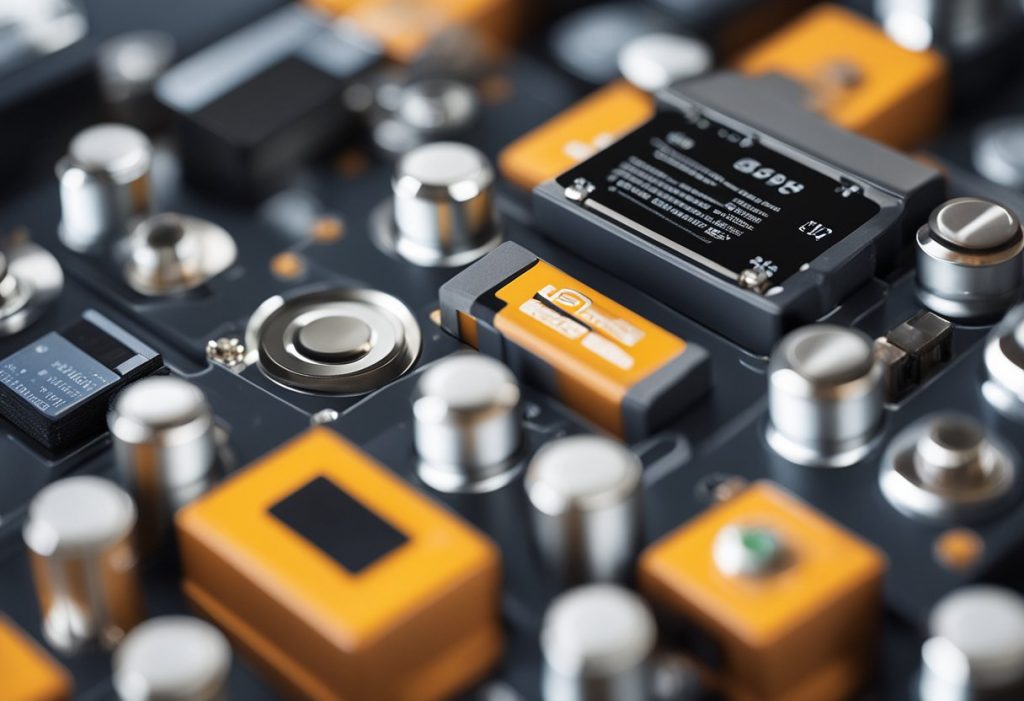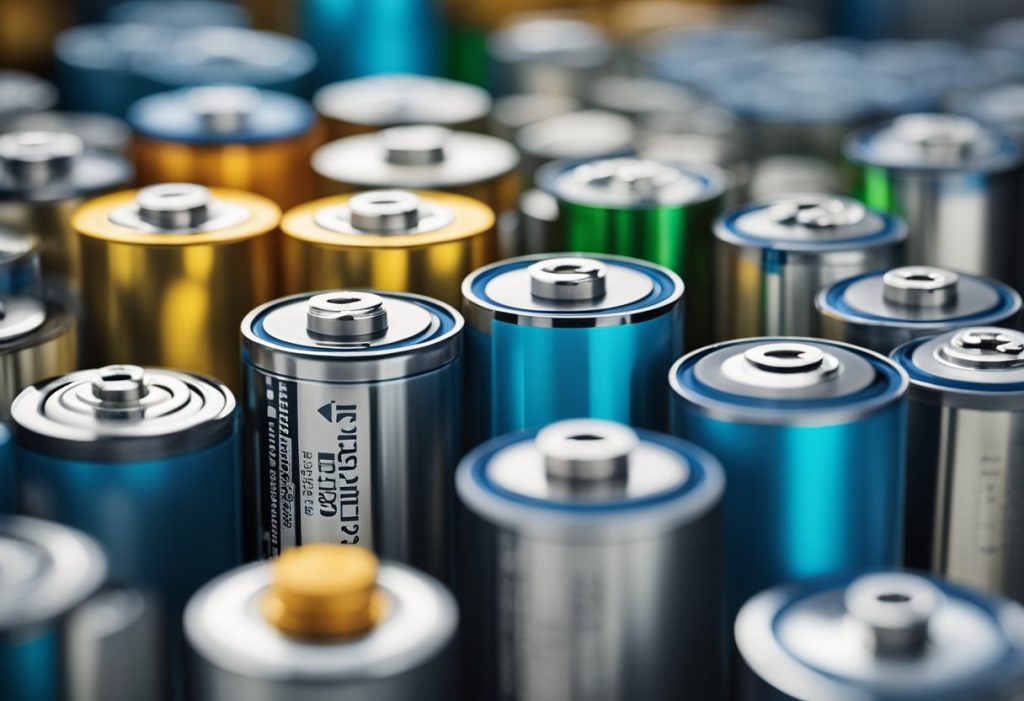Lithium vs Lead acid vs LiFePO4: Which battery is best for solar generators?
Lithium vs Lead Acid vs LiFePO4: Optimal Battery for Solar Generators Explained
When it comes to powering solar generators for power stations, the choice between batteries can be difficult and confusing. With multiple options available, including lithium, lead-acid, and LiFePO4 (lithium iron phosphate) batteries, it's crucial to understand the strengths and weaknesses of each type to make an informed decision for your solar setup. This article will provide a comprehensive comparison of these three popular battery technologies. By the end, you will know which battery is best for your solar generator: lithium vs lead acid vs LiFePO4.

Each of these batteries comes with unique features and characteristics. Lithium batteries are known for their lightweight and compact design, while lead-acid batteries are typically more affordable. LiFePO4, on the other hand, shines with its long-lasting performance, stability, and low-maintenance. By examining factors such as lifespan, cost, energy efficiency, safety, and environmental impact, you'll be able to make a more informed decision about the best battery option for your solar generator.
Key Takeaways
- This article compares lithium, lead-acid, and LiFePO4 batteries for solar generators.
- Factors such as lifespan, cost, efficiency, safety, and environmental impact are considered.
- The information provided will help you find the best battery option for your solar setup.
Overview of Lithium, Lead Acid, and LiFePO4 Batteries

Understanding The Battery Types
When it comes to solar generators, the type of battery you choose is crucial for maximizing efficiency and overall performance. There are three primary types of batteries used in solar generators: Lithium, Lead Acid, and LiFePO4.
Lithium-ion batteries tend to be more reliable, efficient, and have a longer lifespan compared to other battery types. They also deliver a consistent level of power throughout their discharge cycle. This makes them a popular choice for solar installations.
Lead Acid batteries are generally less expensive than lithium-ion batteries but come with a few drawbacks, such as lower energy density and shortened lifespans. While they are often used for solar applications due to their affordability, their performance might not be as optimal.
LiFePO4 batteries, also known as Lithium Iron Phosphate batteries, offer a higher energy density and longer cycle life than lead-acid batteries. They also provide better thermal stability and safety when compared to other lithium-based batteries, making them a suitable option for solar generator setups.
Fundamentals of Solar Generators
A solar generator is a combination of solar panels, a charge controller, an inverter, and a battery. The solar panels convert sunlight into electrical energy, which is then used to charge the battery. The inverter converts the stored energy from the battery into usable electricity for your devices or appliances.
When selecting a battery for your solar generator, you should consider several factors, including:
- Energy Density: The amount of energy stored per unit of volume or weight. Higher energy density batteries can store more energy in a compact space, which increases the overall efficiency of your solar system.
- Cycle Life: How many times a battery can be charged and discharged without significant capacity loss. Batteries with longer cycle life will last longer, reducing the need for frequent replacements.
- Cost: Your budget plays an important role in determining which battery type to choose. While lithium-ion and LiFePO4 batteries may offer better performance, lead-acid batteries are often more affordable, particularly for smaller solar setups.
Ultimately, the best battery for your solar generator will depend on your individual needs, budget, and system specifications. Be sure to consider the performance and longevity of each battery type and make the decision that best meets your requirements.
Detailed Comparison: Lithium vs Lead Acid vs LiFePO4
Comparing Efficiency and Lifecycle
Lithium batteries have a higher energy density compared to lead-acid batteries, which means they can store more energy in a relatively small size and weight. LiFePO4 batteries are even better in this regard, with about 1.5 times the volumetric energy density of lead-acid batteries.
When it comes to cycle life, lithium batteries outperform lead-acid batteries as they can be charged and discharged many times without significant capacity loss. LiFePO4 batteries excel in this aspect too, offering even longer cycle lives.
Evaluating Cost and Maintenance
Lead-acid batteries usually have a lower initial cost compared to lithium and LiFePO4 batteries. However, due to their shorter lifespan and decreased efficiency, they typically need more frequent replacements and maintenance.
Lithium and LiFePO4 batteries, on the other hand, usually have higher upfront costs. But because of their more extended lifecycle, higher efficiency, and lower maintenance requirements, they become more cost-effective in the long run.
Assessing Environmental Impact
Lead-acid batteries pose some environmental risks due to their lead content, which is a toxic heavy metal. Moreover, the acid in these batteries can cause spills and leaks, further contributing to environmental damage.
Lithium batteries have a smaller environmental impact, as they do not contain toxic heavy metals like lead. LiFePO4 batteries are even more environmentally friendly due to their stable, iron-based chemistry, which considerably reduces the risk of thermal runaway and fire hazards.
In summary, it's important to consider your specific needs and budget when deciding between these three battery types for your solar generator. All of them have their own advantages and drawbacks, so making an informed decision based on efficiency, lifecycle, cost, maintenance, and environmental impact is essential.
Finding the Best Battery for Your Solar Generator
Importance of Usage Context
When choosing the best battery for your solar generator, it's important to consider the specific usage context. Every battery type has its own advantages and disadvantages, and the right choice for your solar generator depends on factors like your energy storage needs, cycle life requirements, and budget constraints.
Lead-acid batteries have been commonly used in solar energy systems for years, offering affordability and ease of availability. They are capable of handling deep discharge cycles, but have a shorter overall lifespan compared to other battery types. They also require regular maintenance and venting.
Lithium batteries, particularly Lithium Iron Phosphate (LiFePO4), have gained popularity in recent years for solar generators due to their longer lifespan, higher energy density, and low maintenance requirements. Although they may be more expensive upfront, the return on investment over time can be more favorable with their longer life and better performance.
Considerations for Climate and Location
Climate and location can greatly influence the performance and lifespan of your solar generator's battery. Some battery types are more sensitive to temperature fluctuations, or may require additional environmental precautions.
Lead-acid batteries, for example, should be installed in temperature-controlled environments, as they can suffer from reduced performance due to temperature extremes. They are also sensitive to proper ventilation, since they emit hydrogen gas during operation, which can be a safety hazard if not managed correctly.
On the other hand, LiFePO4 batteries are more stable and versatile in various climates, maintaining their performance even in sub-optimal temperatures. They do not require venting or regular maintenance, making them a more convenient option in remote or difficult locations.
In summary, take into account your specific usage context and the climate of your location when selecting the best battery for your solar generator. Comparing lead-acid, lithium, and LiFePO4 batteries, consider factors such as lifespan, energy density, maintenance requirements, and climate resilience to make an informed decision that suits your needs.
Frequently Asked Questions
What are the key differences between lithium, lead-acid, and LiFePO4 batteries in solar generators?
Lithium-ion batteries have a high energy density, allowing them to store more energy in a smaller, lighter package. Lead-acid batteries are heavier and bulkier but are generally lower in cost. LiFePO4 batteries offer a balance between the two, with a high energy density and a longer cycle life than lithium-ion batteries. They are also safer and can operate in a wider range of temperatures.
How do safety features compare between lead-acid, lithium-ion, and LiFePO4 batteries?
Lead-acid batteries contain hazardous materials like lead and sulfuric acid, which can pose risks if not handled and disposed of properly. Lithium-ion batteries have been known to cause fires due to thermal runaway. LiFePO4 batteries are considered the safest option among the three, thanks to their stable chemistry and strong covalent bonds between iron, phosphorus, and oxygen atoms, which make them less prone to overheating and thermal runaway.
What is the environmental impact of using lead-acid vs lithium-ion vs LiFePO4 batteries?
Lead-acid batteries have a higher environmental impact due to the hazardous materials they contain. Lithium-ion batteries require mining of lithium, which can have negative environmental consequences. LiFePO4 batteries, while still requiring mining for materials, generate less waste and are more environmentally friendly overall.
Which battery type has the longest lifespan and best performance for solar generators?
LiFePO4 batteries generally have the longest lifespan, with a much higher cycle life compared to lithium-ion and lead-acid batteries. They also provide better performance in terms of efficiency and charge/discharge rates, making them an excellent choice for solar generators.
What are the cost-efficiency factors for lithium, lead-acid, and LiFePO4 batteries in solar energy systems?
Lead-acid batteries are typically cheaper upfront than lithium and LiFePO4 options, but they often require more maintenance and have a shorter lifespan. Lithium-ion batteries can be more expensive upfront but offer higher energy density and lower maintenance costs. LiFePO4 batteries are slightly more expensive than lithium-ion batteries but provide longer-lasting performance, making them a cost-effective choice in the long run.
How do lithium-ion, lead-acid, and LiFePO4 batteries compare in terms of maintenance and ease of use?
Lead-acid batteries require regular maintenance, including checking water levels and monitoring voltage levels. Lithium-ion and LiFePO4 batteries need less maintenance and are virtually maintenance-free. They also offer easier installation and operation, which makes them the preferred choice for solar energy systems.
